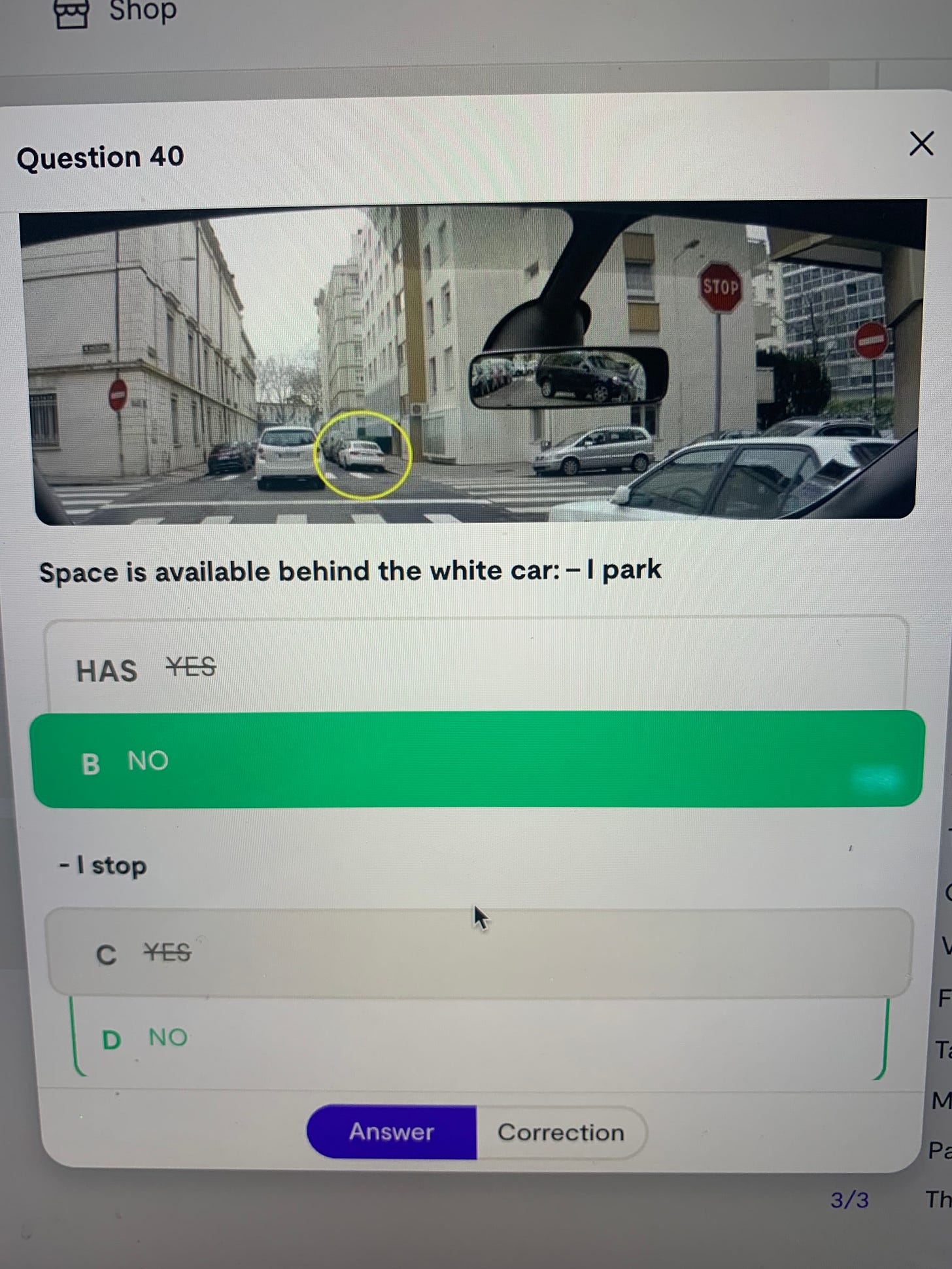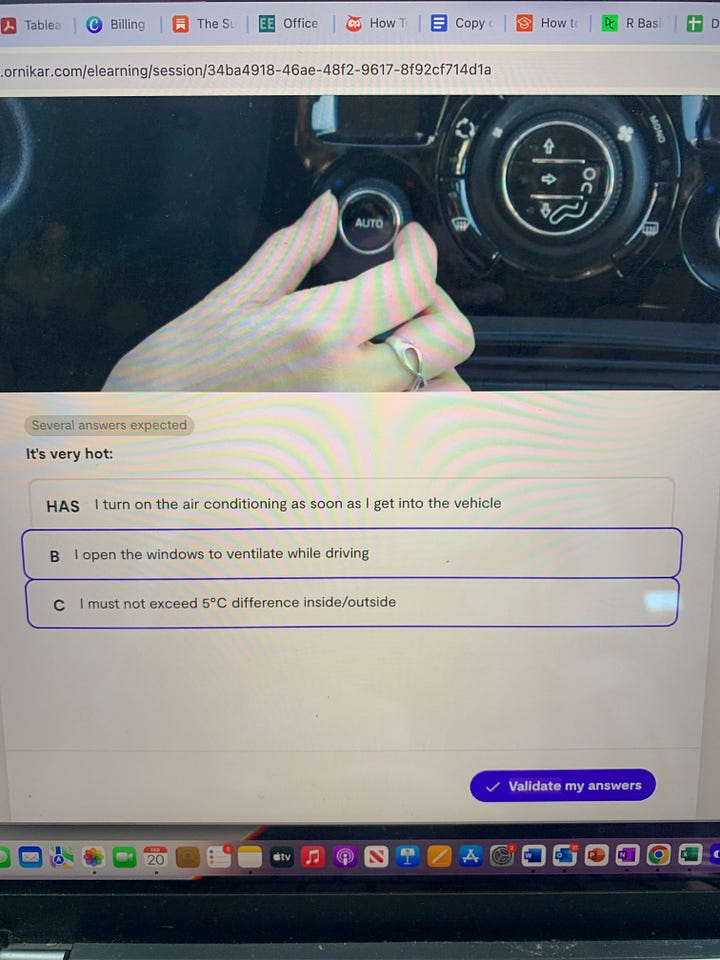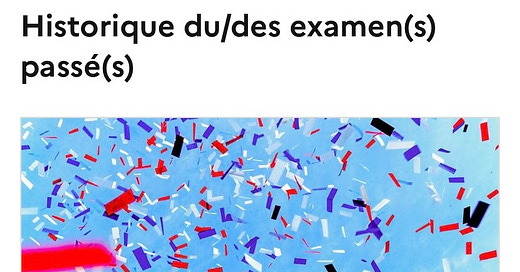I woke up on the morning of June 4th, logged in, and saw this:
I passed! I’m officially a licensed driver in France.
This experience has been a huge trial of patience and perseverance. It’s not like working hard on something meaningful; it’s driver’s license training and testing in your mid-30s. An experience both boring and demoralizing.
The reason I wanted it is so we can more frequently go into the country and mountains for vineyards, small towns, hikes, skiing...but it’s still easy to get lazy and put it off. It’s a time suck when there are many other priorities in life, like building a business, in my case.
And it’s expensive. The average person spends ~ 1500EUR, I’ve spent ~ 800EUR, and a running buddy is 3000EUR and one failed test into it (although they have driven here regularly on their foreign license prior to its grace period ending).
The cherry on top of all of this: everyone in the driving instruction industry treats your 20 years of driving elsewhere as meaningless, so you’re just the dumbass who needs to learn how to drive and they will show you with the finesse and comportment of a cranky uncle (and yes, most instructors and examiners are men).
It’s not a pleasant experience.
With all that, I really did wonder a few times if we could get by without a license. But, I knew we couldn’t, not doing what we really wanted to do anyway, so I sucked it up and held my tongue and passed the mother-fucking French driving test.
An important aside: everything else has been a breeze since arriving here. People have been warm and pleasant. Processes reasonably smooth. Even paying our French taxes is easier. Getting a license is the one exception.
I fully admit that some aspects of this arduous, frustrating, and over-the-top 5-month process have been helpful. Every country will have their own norms and practices. I get that. We as expats need to learn those and adapt.
But most other aspects indicate that the French driving license process was developed by a sadist.
And if I hear “c’est logique” from anyone affiliated with driving instruction in this country one more time I may commit an act that leads to my removal from France. There is little logique in driving here, yet the industry *loves* to throw this term around as if it’s some kind of mathematical proof, but it’s actually just gaslighting because they have no real justification for some of these stupid rules.
How is it logical to check my rearview mirror before braking when a pedestrian steps into the road in front of my car? I do wonder.
Here’s the process, appearing very simple, but is actually not at all:
Register and study for the written test (1-2 months and it usually takes ~ 2-4 weeks to get assigned a number to register for the test)
Take the written test (40 questions, 25 minutes, wait 48 hrs for the results)
Register with a driving school for lessons and to use their dual-control car on exam day because you can’t take the test in a normal car (2-X months depending on how bad a driver you are, new drivers must take a min. of 20 hrs while licensed drivers from elsewhere can take what the school recommends. They told me 8-10.)
Take the practical test (25-30 minutes, if you fail you’re waiting about a month to retake it)
This is all in French.
The Written Test
You need a minimum of 35/40 to pass the written test. I passed on my first try with 37/40. The questions are tricky, to the point of it seeming intentional to confuse, contradict, and confound. The first time pass rate is reported online as between 45% and 55%.
Here are some examples of ridiculous test questions, which unfortunately were numerous:




A lot of people take their written test with their school, but I did mine independently because I wanted to save a couple hundred euros (it cost me 30 bucks).
The Practical Training and Exam
It then came time to find a school. Most are only interested in driving candidates that are brand new so they can squeeze lots of hours out of them (aka money), so I went through several possible schools before finding one that would take accept me since I needed fewer hours.
I ended up doing 10 hours of lessons and taking the test with a mediocre school. Due to French holidays and system backlogs, my last lessons were 18 April and my test was 3 June. Because of this lag, I opted for 2 more hours, for a total of 12 hours, just before my practical test and just after I got back into the country from 7 time zones away. Yikes.
Things that have actually been helpful:
Practicing priorité à droite
Priorité à droite is a special kind of driving hell where some random streets coming from the driver’s right have priority, they do not stop, and you must yield to them. But, there are no signs and no ground markings to indicate this. There *might* be one sign 50m ahead of the actual intersection to tell you you’ll need to yield at the next one, or there might have been a single sign 4 miles back that told you you were not on a priority road. These priority intersections can be tiny roads spilling onto fast and large ones, they can be hidden behind large walls or buildings, or look like a parking lot. Fun times.
Learning the rules of roundabouts
There’s a whole system for where to place your car in the roundabout (hug the inside, stick to the outside), when and which turn signals to use, and some even require the cars ALREADY IN THE ROUNDABOUT to yield to cars entering because they’re considered priorité à droite. Madness.
Signage, or lackthereof.
For all the hundreds of road signs France has, it’s amazing how sometimes they simply choose not to use them (speed limits, intersections…)
Speed limit signs are largely absent off the highway. You’re just supposed to know when you’ve left a township (a “built up area”) which means you can do 80km/h instead of 50km/h. If you missed the sign indicating you’ve left, welp.
Things you must do during the practical exam, among the 29 possible things that get you automatically eliminated:
Always check your driver’s side blind spot before exiting a roundabout. Why? Don’t know. It’s probably logique.
Always check the rearview mirror and both exterior mirrors before braking (not always practical, like when a sudden stop is required to not hit someone).
Never put the transmission into neutral before coming to a complete stop, because “safety”.
You should be as close as possible to the speed limit, but not over it. This alleges to not impede other drivers while maintaining safety. You have only a 5km/h grace over without an automatic fail. This comes up fast since these are smaller units than mph.
What ends up happening is you give more attention to the odometer than is safe or practical when you should really be looking for other road users and scanning all points of an intersection’s signage and ground markings to check for priorité intersections
You have to park the car by backing into a spot if they don’t have you parallel. I’m assuming this is also supposed to be “logique”. But if you go in front-first you fail.
Check out this youtube video from another American who shares my feelings. It’s worth the time. Note, 3 weeks is highly abnormal.
The day of my exam I was super stressed because I was almost late due to having to take two buses to the exam location—one bus had been late and the next one’s stop had moved so it took me forever to find it. If I’d missed my time slot I would have had to wait at least another month to take the test which might have been my undoing.
I arrived just on time though, had two minutes to breathe, and then took the test. It wasn’t perfect (being repeatedly told by a French dude to go faster and get my foot off the clutch on a notoriously hard to pass test causes a lot of second-guessing). You have to follow road signs for cities/towns they tell you to travel to, there’s no GPS or maps, no backup cams, and no other means of getting yourself there except the signage that is often covered by trees. I didn’t realize how dependent I’d become on GPS saying things like “take the third exit out of the roundabout” instead of me just following signs to Paris. Also, imagine going around a roundabout and trying to look at the signs on the other side of a circle…it’s not easy to look ahead and plan ahead.
Regardless, I passed my test on my first try with 23/31, where you have to get 20 to pass. So while it’s actually a terrible score I’m taking the W and moving on.
—Leslie







Congratulations! Glad we could be some assistance (jk)! I’ll give you a good rating and review.
Glad this source of stress of over for you now!! Congrats!